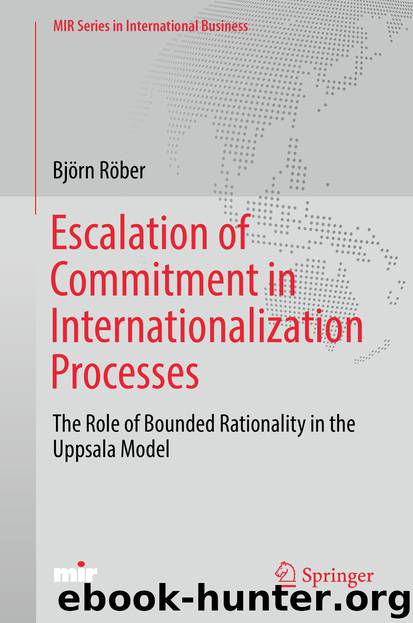Escalation of Commitment in Internationalization Processes by Björn Röber

Author:Björn Röber
Language: eng
Format: epub
Publisher: Springer International Publishing, Cham
Hypothesis 2
Compared with a non-committed peer-group, managerial decision-makers in internationalization processes, who are under escalation of commitment, will increasingly diverge from the logic of rational choices with an increasing psychic distance to targeted markets.
3.3.7.3 Moderating Effect of the Establishment Chain Progress on the Impact of Escalation of Commitment on Internationalization Process Decision-Making (H3)
Similar to the implications of psychic distance, the establishment chain progress could also develop a moderating influence on the impact of escalation of commitment on internationalization process decision-making. The Uppsala School of Thought considers internationalization to be an incremental learning process, during which firms acquire knowledge about foreign markets gradually and during which they increase their commitment in respective countries step by step.229 This is reflected in the establishment chain, according to which firms initially choose exports as the market entry of choice, and according to which they establish wholly owned subsidiaries only subsequently.230 The different steps of the establishment chain can—like market entry modes in general—be structured in a hierarchical order along the amount of committed resources (i.e., from non-equity-based to equity-based).231 The underlying assumption of the Uppsala School of Thought is that internationalization processes are per se risky as companies will be confronted with different market and institutional environments. In response to this risk, firms will try to commit as few resources as possible in the beginning of their internationalization process, thus reducing eventual capital losses in cases of internationalization failures. Therefore, the establishment chain progress is little initially. In later stages of the establishment chain, more capital becomes committed to respective foreign markets. While one might object that export-based internationalization also binds capital (because firms are still confronted with different market and institutional environments),232 it is a relatively convincing argument to say that little establishment chain progress requires significantly less capital in comparison to later establishment chain stages. Consequentially, a failing internationalization path is potentially less costly during the early stages of the establishment chain.
Yet, how could the establishment chain progress develop a moderating influence on the impact of escalation of commitment on internationalization processes? As different forms of market entry involve different degrees of bounded capital, a withdrawal from an internationalization process becomes associated with different degrees of withdrawal costs. Especially in scenarios of little establishment chain progress, this could be perceived differently by managerial decision-makers in dependence of their commitment. Following the argumentative proceeding of the previous two sections, a comparative approach between a rational, i.e., non-committed, decision-maker and a counterpart under escalation of commitment will be conducted. A rational internationalization manager, who has incurred losses due to previous internationalization process decisions, should already be marked by an increased readiness to withdraw from the decision path. Supposing that the decision-maker wanted to continue the course of action nevertheless and given that this happens in a context of little establishment chain progress (this means that exports have been the chosen form of market entry), he/she will now be confronted with little bounded capital and, therefore, lower costs of withdrawal (in comparison to equity-based market entries).
Download
This site does not store any files on its server. We only index and link to content provided by other sites. Please contact the content providers to delete copyright contents if any and email us, we'll remove relevant links or contents immediately.
The Meaning of the Library by unknow(2557)
Six Billion Shoppers by Porter Erisman(2290)
Why Nations Fail: The Origins of Power, Prosperity, and Poverty by Daron Acemoglu & James Robinson(2275)
No Time to Say Goodbye(2107)
Red Notice by Bill Browder(2068)
Currency Trading For Dummies by Brian Dolan(1915)
The Economist [T6, 22 Thg9 2017] by The Economist(1914)
Thank You for Being Late by Thomas L. Friedman(1761)
Bitcoin: The Ultimate Guide to the World of Bitcoin, Bitcoin Mining, Bitcoin Investing, Blockchain Technology, Cryptocurrency (2nd Edition) by Ikuya Takashima(1687)
Amazon FBA: Amazon FBA Blackbook: Everything You Need To Know to Start Your Amazon Business Empire (Amazon Empire, FBA Mastery) by John Fisher(1558)
Coffee: From Bean to Barista by Robert W. Thurston(1521)
The Future Is Asian by Parag Khanna(1473)
The Great Economists by Linda Yueh(1447)
How Money Got Free: Bitcoin and the Fight for the Future of Finance by Brian Patrick Eha(1416)
Grave New World by Stephen D. King(1414)
Pocket World in Figures 2018 by The Economist(1406)
Capitalism Without Capital: The Rise of the Intangible Economy by Jonathan Haskel(1389)
The Sex Business by Economist(1373)
Cultural Intelligence by David C. Thomas(1285)
